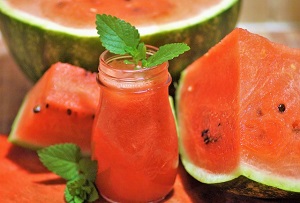When it comes to heat-related illnesses, the focus should be on staying hydrated and consuming foods that help replenish essential nutrients lost through sweating. Additionally, choosing foods that have a cooling effect can be beneficial. Here are some foods that can be helpful during heat-related illnesses:
1. Watermelon
Watermelon is high in water content, making it a great hydrating fruit. It also contains electrolytes like potassium, which can help restore the body’s mineral balance.
2. Cucumber
Cucumbers are rich in water and provide a refreshing and hydrating snack. They also contain vitamins and minerals that can support overall health.
3. Coconut Water
Coconut water is a natural source of electrolytes, including potassium and magnesium, making it an excellent choice to rehydrate and replenish minerals lost due to sweating.
4. Citrus Fruits
Oranges, lemons, and limes are rich in vitamin C and provide a refreshing taste. Vitamin C can also support the immune system, which might be affected during heat-related illnesses.
5. Berries
Strawberries, blueberries, and raspberries are hydrating fruits that are also packed with antioxidants, vitamins, and minerals.
6. Leafy Greens
Lettuce, spinach, and other leafy greens contain a good amount of water and provide essential nutrients like vitamins A and K.
7. Yogurt
Plain yogurt is a good source of probiotics and calcium. It can be a cooling and easy-to-digest option during hot weather.
8. Mint
Mint leaves can add a refreshing flavor to salads, smoothies, or infused water. It may also have a cooling effect on the body.
9. Cilantro
Cilantro, also known as coriander leaves, is a herb that can be added to various dishes for its cooling properties.
10. Celery
Celery is a crunchy vegetable with high water content, providing hydration and essential nutrients like potassium.
During heat-related illnesses, it’s essential to avoid certain foods that can exacerbate dehydration or lead to discomfort and other health issues. Here are some foods to avoid during hot weather and heat-related illnesses:
1. Caffeinated Beverages
Drinks like coffee, black tea, energy drinks, and soda can have a diuretic effect, which may contribute to dehydration.
2. Alcoholic Beverages
Alcohol can dehydrate the body and impair judgment, making it dangerous in hot weather.
3. High-Sugar Foods
Consuming excessive sugary foods, especially in the form of candies, pastries, or sugary drinks, can lead to rapid spikes in blood sugar levels, potentially affecting hydration.
4. Spicy Foods
Spicy foods can increase body heat and lead to discomfort, especially in hot weather.
5. Fatty or Fried Foods
Foods high in fat or deep-fried can be harder to digest, causing discomfort and potential gastrointestinal issues during heat-related illnesses.
6. Salty Snacks
While some salt is necessary to replenish electrolytes, excessive salt intake can lead to dehydration and may contribute to high blood pressure.
7. Heavy, Rich Meals
Avoid large and heavy meals, as they can strain the digestive system and cause discomfort during hot weather.
8. Processed Foods
Processed foods are often high in sodium and unhealthy fats, and they may not provide the necessary nutrients to support your body during heat-related stress.
9. Refined Carbohydrates
Foods made with refined flour and sugars, such as white bread, cookies, and cakes, can lead to rapid spikes in blood sugar levels and may contribute to dehydration.
10. Red Meat
Consuming large amounts of red meat can be harder on the digestive system and may lead to discomfort in hot weather.
During heat-related illnesses, prioritize hydrating with water and electrolyte-rich beverages. Choose light, fresh, and hydrating foods like fruits, vegetables, and lean proteins. Remember that while these foods can be helpful during heat-related illnesses, they should be part of a balanced diet. Listen to your body and avoid anything that may worsen symptoms or make you feel uncomfortable in the heat.
It’s important to remember that everyone’s tolerance to different foods can vary, and some individuals may be more sensitive to certain food types than others. If you have specific dietary restrictions or health conditions, consult a healthcare professional or a registered dietitian for personalized advice.

